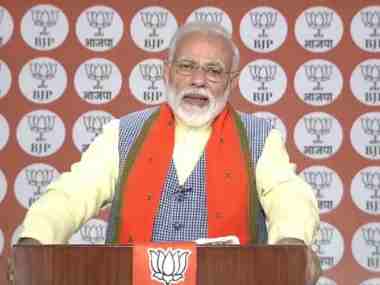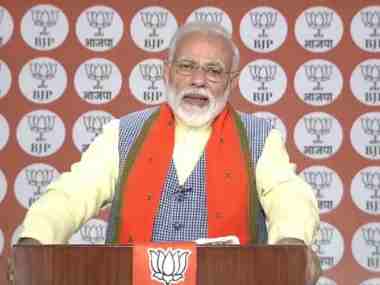The Narendra Modi government assumed power with a substantial mandate at a time when oil prices were at a historic low in 2014. The Congress-led United Progressive Alliance (UPA) government had ruled for ten long years, and was burdened with scandals. It appeared that the historic majority won by Modi for the Bharatiya Janata Party (BJP) was a fitting reply to the Congress’s version of dynastic politics undermined by scandals. Modi began his tenure with a good governance agenda—he would clean India, spur growth and generate employment in the industrial sector. There would be no need for employment generation programmes like the Mahatma Gandhi National Rural Employment Guarantee Scheme (MGNREGS) in a skilled India replete with opportunities. [caption id=“attachment_6171151” align=“alignleft” width=“380”]  PM Modi during the Mera Booth Sabse Mazboot conference. Twitter/@BJP4India[/caption] Despite these noble intentions, governance has hardly benefited the common citizen. There is a raging debate over growth and employment figures. The unemployment rate doubled in 2017-18 as reported by the unpublished National Sample Survey Organisation (NSSO) report. Two members of the National Statistical Commission have resigned owing to the non-release of this report, generated in December 2018. They claimed that an organisation [NSSO] with impeccable credentials for being unbiased was unfairly challenged by the current deputy chairman of the National Institution for Transforming India (NITI) Aayog. Could the government be worried about unemployment figures on eve of the forthcoming general elections? Good governance requires smart technocrats in the bureaucracy. Whether it was the reforms of 1991 or sectoral initiatives such as establishing the National Stock Exchange, the Securities and Exchange Board of India, the Telecom Regulatory Authority of India or implementing the right to work, technocrats in the bureaucracy played a significant role. Good political intention required competence in the bureaucracy. There was bad news on this front. There has been a spate of senior-level resignations. Two chief economic advisers to the Union finance minister have left as have the founding deputy chairman of the NITI Aayog, and two governors of the Reserve Bank of India (RBI). India’s governance is a delicate balance between smart technocrats and the political class. Technocrats not only follow political direction, they often make proposals to politicians regarding how they can benefit citizens and win elections. It is a matter of concern that so many technocrats selected by the ruling party parted ways with government in quick succession. A few examples will highlight the importance of techno-political synergies for producing winning governance solutions in India. It is a curious fact that RBI governor Raghuram Rajan left before the infamous demonetisation. Gone are the days when it was opined that demonetisation would uproot corruption. If `500 and `1,000 notes spurred corrupt cash transactions, today we have a bigger opportunity in the `2,000 note. Middle-class women had saved cash that was lost in the name of fighting corruption. Even the government’s chief economic adviser Arvind Subramanian called demonetisation a draconian shock after quitting office in 2018. Which competent economist would have advised demonetisation to fulfil a political agenda? Most recently, RBI governor Urjit Patel resigned after a raging debate regarding the Central bank’s autonomy. This was the shortest tenure in RBI’s history. Patel was averse to fiscal profligacy in a pre-Budget year and had attempted to clean the bad debts of powerful corporates. Loyalty to the country, for the governor, may have come before loyalty to the Prime Minister even though Patel resigned for personal reasons. The autonomy of India’s regulatory institutions is critical for democratic governance. Employment generation was a prime concern for the BJP government. The government had opined that programmes like MGNREGS would become redundant in a rapidly growing economy. The government launched the ‘Make in India’ programme alongside a new Ministry for Skill Development. One would have thought that Modi would skill the youthful Indian workforce to earn political immortality. What are the results of skilling India? The controversial unpublished NSSO report opined that the unemployment rate had risen to 6.1 per cent from a consistent rate of 3.0-3.5 per cent between 1994 and 2012. The public sector continued to employ more persons than the private sector. Employment generation decelerated, but the fire behind the MGNREGS deployed to implement the right to work had also cooled. It is rumoured that a senior civil servant persuaded the government not to ignore the right to work in the early days of this government. Over time, that view was validated by unemployment statistics. Allocations for the right to work could therefore not be reduced. The problem with implementing MGNREGS has been delayed payment of wages. It is most visible in parts of the country where the programme was implemented most effectively. To give just one example, I visited some villages in Lingampet Mandal in Nizamabad district (Andhra Pradesh, now Telengana) in 2013, and again in 2015. In 2013, villages in this Mandal deployed biometric attendance. Workers were uniquely identified and paid decent wages. A governance innovation in the form of worker’s unions had been introduced and the local programme officer had even won a national-level award. No longer did the workers have to migrate seasonally to greener pastures such as Guntur in search of work. The condition of workers had taken a substantially negative turn by 2015. Wage payments were excruciatingly delayed to such an extent that workers were hesitant to receive MGNREGS wages. They routinely migrated to the more prosperous parts in the times of need. What one witnessed in 2013 was fiction in 2015. It is not surprising therefore that the share of households at the national level that did not receive any MGNREGS employment has been growing since 2014. The 2014 election was won on the mandate of serving the citizenry at large. The political quest for good governance seems to have lacked both winning ideas and competence. Unemployment has soared at the very moment when the right to work has met a stepmotherly treatment. This is not the best way for the government to approach the 2019 elections.
Modi began his tenure with a good governance agenda—he would clean India, spur growth and generate employment in the industrial sector. There would be no need for employment generation programmes like the Mahatma Gandhi National Rural Employment Guarantee Scheme (MGNREGS) in a skilled India replete with opportunities. Despite these noble intentions, governance has hardly benefited the common citizen
Advertisement
End of Article


)

)
)
)
)
)
)
)
)



